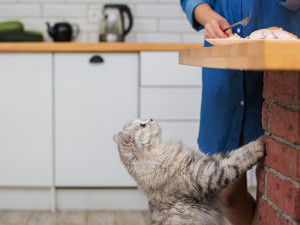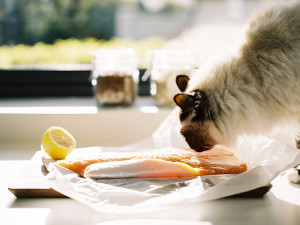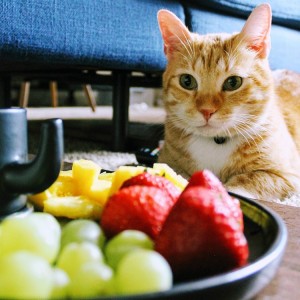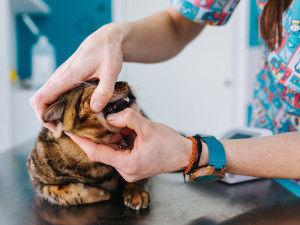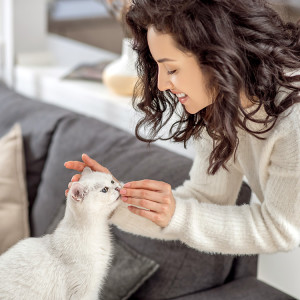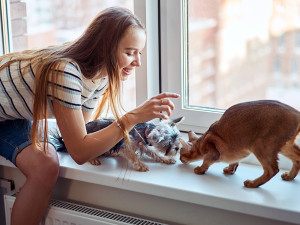Can Cats Eat Rice?
A warm bowl of rice is your cat’s version of comfort food
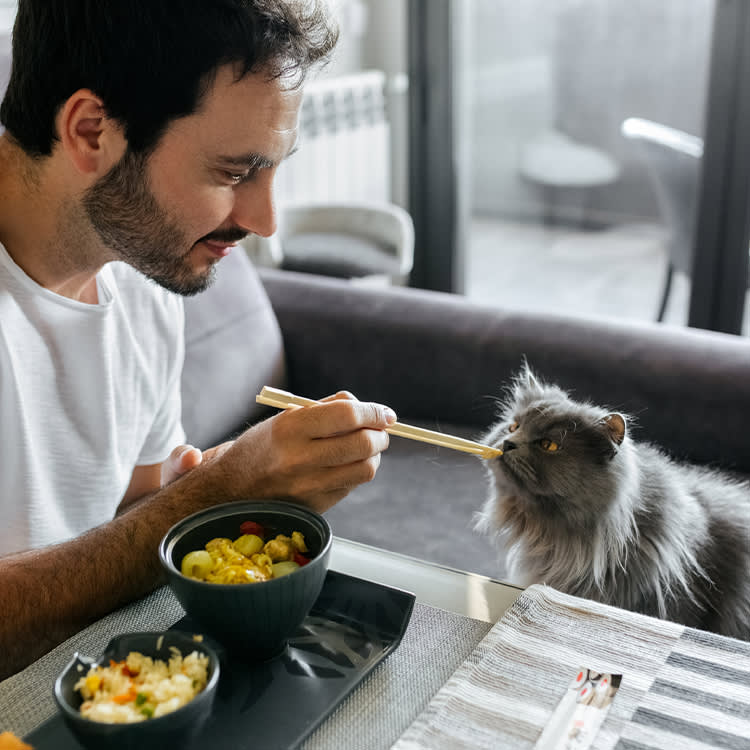
Share Article
Rice can be a hearty addition to so many meals, turning the most basic leftovers in your fridge into delicious comfort food. So, you may be wondering if your kitty can partake in a warm bowl of chicken and rice, or mouse and rice for those lucky enough to have cats who actually provide pest control.
As it turns out, rice is a safe food to share with your cats in moderation and it has many health benefits too. However, there are some situations when it may be better to hold the rice for cats that have certain health conditions such as diabetes. Find out all about the benefits of rice and when it can be safely shared with your feline friends.
Nutrition facts for rice
Rice has been a staple foodopens in new tab for humans for thousands of years and provides many important nutrients. There are more than 40,000 different kinds of rice within the species Oryza sativa, the plant that rice is harvested from. No doubt, as cats became domesticated over many thousands of years, they likely ate more than the occasional grain of rice.
Rice is prepared in many different ways around the world, and one main difference is whether the rice is prepared as a whole grain, known as brown rice, or whether it has been processed to remove the bran layer, known as white rice. White rice tends to lack some of the nutrients and fibre contained in the bran layer of brown rice. Some of the most important nutrients in rice include:
Fibre: brown rice contains more fibre than white rice. Fibre is an important carbohydrate that helps bulk up the material in the digestive tract and prevents constipation.
Vitamins: rice contains Thiamin and B6, which play an important role in many cell functions including energy supply, immune function and brain health.
Minerals: magnesium, phosphorus and selenium are all found in rice and are important for heart, bones, teeth, muscles and nerves to function properly.
Is rice good for cats?
This is a nuanced question that varies based on your cat‘s individual health and needs. Overall, rice is safe for cats to eat and like other carbohydrates, it can provide much-needed energy for cats along with some valuable nutrients. There is a bigger question to consider as well: how much do cats really need carbohydrates in their dietopens in new tab?
Wild felines, as well as domestic cats who hunt for their food have very low carbohydrate intakes. This is because their diet comes entirely from the prey that they catch. Cats are obligate carnivores, which means they need large amounts of protein and fat as the bulk of their diet.
While they cats do have a great need for carbohydrates, most of them can digest them without any problem, and they can be a good source of energy and nutrients. Some cats should avoid carbohydrates if they have health problems such as diabetes or are overweight. There are specialised diets for cats with these health conditions that contain much lower levels of carbohydrates. While rice does provide some valuable nutrients, it should never replace protein and fat as the main components of a cat‘s diet. It is good for cats in moderation and as long as it is part of a complete and balancedopens in new tab diet.
Can cats eat other products made from rice?
Because rice is non-toxic to cats, many products made from rice could be safe for cats in small amounts as well. It is important to check the packaging to ensure it does not contain any other ingredients that may be toxic for cats, including garlic, onions, grapes, raisins or chocolate. It is also important to avoid giving cats any products that are high in sugar as this can contribute to diabetes and obesity.
Is completely rice safe for cats?
Overall, rice is considered a safe food for cats and is found in many cat foods. There are a few points to keep in mind if you are considering feeding your cat rice, though.
Moderation: rice is fine as an occasional treat or when it is part of a complete and balanced commercial cat food diet. Feeding lots of carbohydrates could put your cat at an increased risk for obesity, diabetes and/or nutritional deficiencies if it replaces other important foods in their diet.
Arsenic: in recent years, studies have shownopens in new tab that rice grown in areas with contaminated soil and/or water tends to accumulate higher levels of arsenic. This is a toxin that can cause serious illness at high enough levels. Brown rice tends to have higher levels of arsenic than white rice since the arsenic is more concentrated in the bran layer. This is only a concern when large amounts of rice are consumed daily and should not be a risk factor for cats that consume small amounts.
The bottom line: can cats eat human food?
Some human foods can make a great addition to your cat’s primary diet. Because cats have unique nutritional needs, it is very important that the bulk of their diet – at least 90 percent – comes from a complete and balanced cat food. If you want to supplement their primary diet with the occasional small treat, there are many great cat treats to choose from, or you can consider sharing some human foods with them as well.
Be sure to always check that the foods you share are safe and non-toxic opens in new tab to cats and that you limit treats to a healthy amount. Always offer a very small amount of the food at first to see if your cat is interested and make sure to offer it in a way that will be easy for your cat to eat; cooled to room temperature, bite-sized amounts and without any sharp parts that could be a choking hazard like bones, toothpicks or shells. If you have any questions about what foods would be safe to share with your cat, especially if your cat has underlying health problems or eats a special diet, be sure to consult your veterinarian first.
Other foods that are safe for cats
Blueberries can also be a tasty and healthy snack for your cat.
Pumpkin can be a good source of fibre and other nutrients for cats.
Natural peanut butter can be a high-protein treat when used in small amounts.
Other foods that are dangerous for cats
Onions can cause anaemia in cats; avoid sharing any foods cooked with onions with your cat.
Chocolate is toxic to cats and should be kept out of reach.
Garlic is also a big no, no for cats because it can cause serious illness.
Frequently asked questions
How much rice can cats eat?
If rice is part of your cat’s food, it has already undergone careful testing to ensure the proportions are appropriate. If you are considering offering your cat rice as a treat, one tablespoon would be a good serving size. Be sure treats never account for more than 10 percent of your cat’s daily calories.
Why do cats like rice?
Cats may be curious about rice because it is usually served warm and/or because of its texture. Cats can be very finicky and many cats may not be interested in rice.
Can cats eat rice milk?
Rice milk is safe for cats for the occasional lick or two, but it is often sweetened and is high in carbohydrates so it should not be part of their main diet.
References:

Dr. Amy Fox, DVM
Amy Fox, DVM is a small animal veterinarian in New York City. A lifelong animal lover, Dr. Fox studied biology in college and then worked as a veterinary nurse before pursuing veterinary school at Cornell University. She has worked in many different settings including shelter medicine, emergency medicine, general practice, and animal cruelty and forensics. She is especially interested in nutrition, preventative medicine and care for senior pets. Dr. Fox also enjoys writing about veterinary medicine and teaching. In her free time she loves to cook, garden, and go for long runs.
Related articles
![Young female veterinarian in her consulting room performing a medical examination on a pet]()
What You Need to Know About Cat Mouth Ulcers
How to spot, diagnose and treat the painful lesions – whether cancerous or non-cancerous
Can Cats Eat Popcorn?
They want to enjoy movie night, too, you know
![Woman giving her white cat a vitamin.]()
Does My Cat Need Supplements?
Time to take kitty on a Holland & Barrett spree? Maybe
![Woman playing with her cat and dog.]()
Have a Cat But Want a Dog, Too? Here’s How to Make It Work
Just a few things to keep in mind so everything goes smoothly as you all get adjusted
![]()
Are Cats Lactose Intolerant?
The cat got the cream – but is it good for them?

